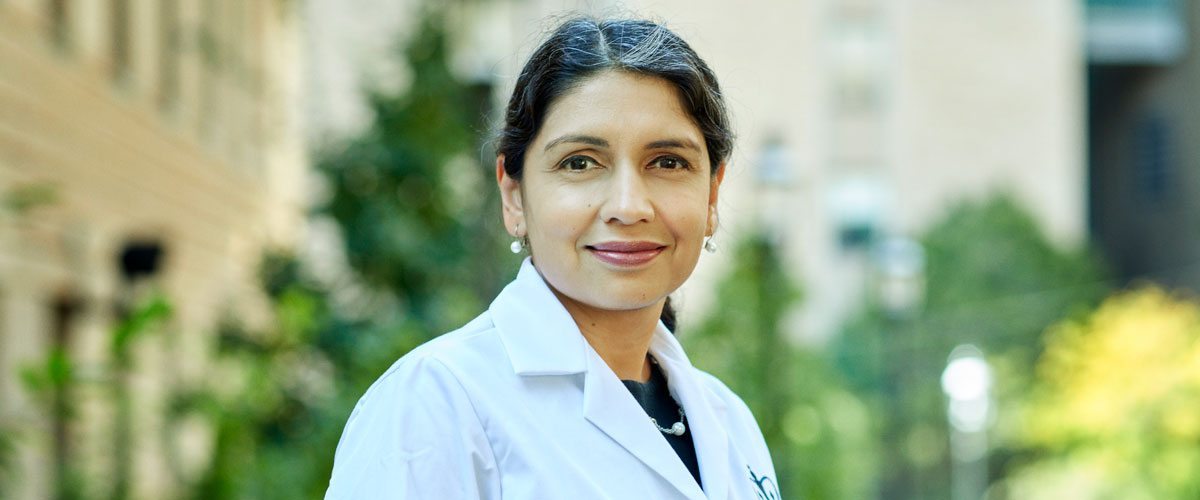Inside NYP: Dr. Roshni Rao
The new chief of NewYork-Presbyterian/Columbia University Irving Medical Center's Breast Surgery Program is researching the links between ancestry, diet, and exercise in her quest to treat not just cancer, but the whole person.


I wanted to be a doctor since I was 4 years old. Back in India, where I was born, we used to have brooms with very long quills. I’d pluck them out, then run around giving “injections” to all of my relatives. My family moved to Columbia, Missouri, when I was 10, but it wasn’t until two years later that I got hooked on surgery when I saw my first surgical amputation — a leg that had a sarcoma, which is an aggressive cancer. While other kids were at summer camp, I signed up for a course that introduced middle school students to the medical field. They put us in scrubs and I was able to visit an operating room. I was excited by the way surgeons really used their hands and got right in there. I’ve always enjoyed fixing things and working with my hands. At the end of the day, it leaves me feeling like I’ve accomplished something.
I didn’t intend to become a breast surgeon, but I ended up interacting with many breast cancer patients during my medical training and found that I was drawn to them. Typically, they are extremely motivated and will do whatever it takes to get better. Maybe that’s because women are just good at getting things done. We have a laundry list of tasks — take care of our kids, our spouses, work — then, when cancer ends up on the list, we just deal with it.
People always ask me why rates of breast cancer are going up. One reason is the obesity epidemic. One of my research interests is how lifestyle changes like exercise can help prevent breast cancer and even improve outcomes in patients who already have the disease. Here, in New York City, I walk 12 miles a day without even trying. But when I was working in Texas, before joining NewYork-Presbyterian, I wanted to get in better shape, so I signed up for an hourlong boot-camp class three times a week.
I have always been a runner, but I wanted to get fitter and I wanted better arms. After seeing Michelle Obama, I thought, “I need those arms.” After a month, I felt great, and I ended up collaborating with a personal trainer to set up a study. We wanted to see if exercise could make a difference in overweight breast cancer patients who were undergoing chemotherapy. In one group, we had patients work with the trainer three times a week then compared them with a second group, which received chemotherapy but didn’t exercise. The patients who worked out not only lost weight; their tumors shrunk more quickly and were less aggressive. I want to take this research to the next level here at the Herbert Irving Comprehensive Cancer Center by seeing how exercise might help breast cancer patients get through chemotherapy more easily, with less nausea and fatigue.
“As a breast surgeon, you’re kind of the quarterback of the team. Patients see me as the starting point of their treatment as well as their advocate.”— Dr. Roshni Rao
I’ve also been researching the link between a person’s ancestry and their likelihood of getting what’s known as triple-negative breast cancer, a hard-to-treat form that tends to be more common in women of color and Ashkenazi Jews. It accounts for only 15 percent of all cases, but it’s responsible for a disproportionate number of deaths. Now that I’m in New York City, with its tremendously diverse population, I want to focus on figuring out which ethnicities are most at risk for this form of the disease. That way, we can steer those patients toward more intensive screening as well as lifestyle interventions, like making diet and exercise changes. I have published a study on the role of ethnicity and the risk of developing triple-negative breast cancer in the journal Cancer, which is an oncologist’s version of Vogue.
As a breast surgeon, you’re kind of the quarterback of the team. Patients see me as the starting point of their treatment as well as their advocate. I’ve had relationships with some patients for five or 10 years — they keep coming in even when I tell them they don’t need to see me anymore. Cancer treatment can be harsh; chemotherapy can affect the health of a patient’s heart down the line, as well as her long-term survivorship. At the Herbert Irving Comprehensive Cancer Center, the focus is on total patient care, which is why I’m so honored and excited to be here. They could have had anyone at this renowned institution, and they chose me to spearhead this program. My goal is to not just take care of a patient’s cancer, but to care for the entire person — her heart, her mind. I want to make women whole again.
Dr. Roshni Rao, FACS, is chief of the Breast Surgery Program at NewYork-Presbyterian/Columbia University Irving Medical Center and the Vivian L. Milstein Associate Professor of Surgery.

